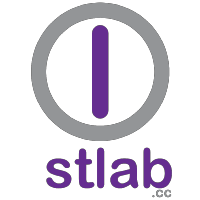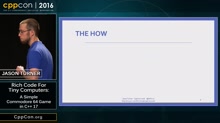C++ Weekly Episode 70: C++ IIFE in quick-bench.com—Jason Turner
Episode 70 of C++ Weekly.
C++ IIFE in quick-bench.com
by Jason Turner
About the show:
We are commonly taught to
consteverything that we can in C++. One way to accomplish this goal in the post-C++11 world is to use a immediately invoked lambda (equivalent to an IIFE in the JavaScript world) that generates a value for us, which we assign to a const value. But what impact does this design decision have on the quality of code generated and the performance? In this episode of C++ Weekly we use the new website quick-bench to test the various options available.

 Have you registered for CppCon 2017 in September?
Have you registered for CppCon 2017 in September?  Have you registered for CppCon 2017 in September?
Have you registered for CppCon 2017 in September?  Have you registered for CppCon 2017 in September?
Have you registered for CppCon 2017 in September?  Have you registered for CppCon 2017 in September?
Have you registered for CppCon 2017 in September?  Have you registered for CppCon 2017 in September?
Have you registered for CppCon 2017 in September? 
 Have you registered for CppCon 2017 in September?
Have you registered for CppCon 2017 in September?  Have you registered for CppCon 2017 in September?
Have you registered for CppCon 2017 in September?